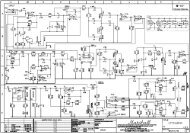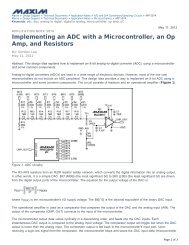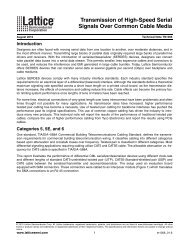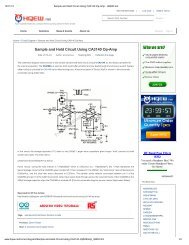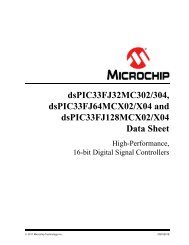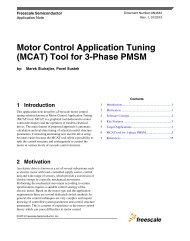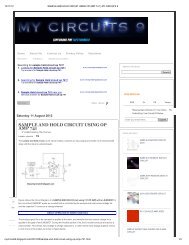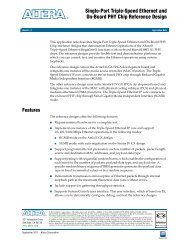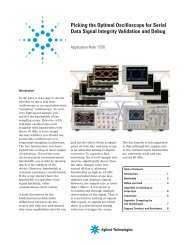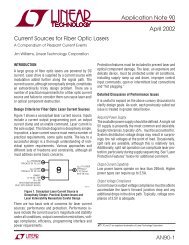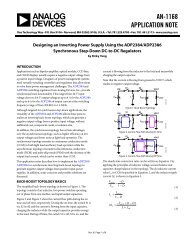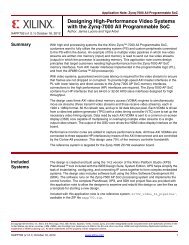ee pulse - EEWeb
ee pulse - EEWeb
ee pulse - EEWeb
You also want an ePaper? Increase the reach of your titles
YUMPU automatically turns print PDFs into web optimized ePapers that Google loves.
INTERVIEW<br />
new platforms. People use money<br />
to say what they like and don’t<br />
like. It is impossible to survive in<br />
the semiconductor industry if you<br />
produce the same product year<br />
after year. This ever-present drive<br />
to improve and innovate is what<br />
makes it fun.<br />
What are you currently<br />
working on?<br />
I am the new manager for the<br />
applications group focused on<br />
optical sensors. (These are ambient<br />
light or proximity (IR) sensors.) I<br />
have the privilege of leading a<br />
talented team of engin<strong>ee</strong>rs as we<br />
work with the greatest electronics<br />
manufacturers around the world.<br />
Sensors are special because it isn’t<br />
just an electrical system. It’s an<br />
optical and mechanical one, too.<br />
Will the device be behind some kind<br />
of glass? Will there be plastic with<br />
a hole to allow access for the light?<br />
How much light can bounce around<br />
inside the product? How reflective<br />
is an object you want to target?<br />
(Black hair happens to be very<br />
non-reflective, yet the cell phone<br />
manufacturers want to turn off the<br />
touch scr<strong>ee</strong>n before you bring the<br />
phone to your ear. They don’t want<br />
it to only work for blondes…)<br />
What direction do you s<strong>ee</strong><br />
your business heading in the<br />
next few years?<br />
Sensors are growing like crazy!<br />
Consumer devices want to interact<br />
more naturally with their users.<br />
They want to save us power by<br />
turning down the backlight of a<br />
scr<strong>ee</strong>n in low-light conditions, so we<br />
can enjoy longer battery life. They<br />
want to understand our questions<br />
and interpret our gestures. They<br />
want to anticipate our desires and<br />
prepare. They want to help camera<br />
understand what kind of lighting<br />
conditions they operate in so we<br />
can take better pictures. There are<br />
so many more examples.<br />
What challenges do you<br />
fores<strong>ee</strong> in our industry?<br />
There are lots of challenges. The<br />
global work force is adjusting<br />
its footprint. While it might be<br />
advantageous to use cheaper<br />
labor, the time, cultural and<br />
communication differences are a<br />
big stumbling block for projects<br />
that span multiple continents. Still,<br />
money is a stronger driving force<br />
(especially in the limping recession)<br />
so we are willing to accept the<br />
challenge.<br />
Another challenge is “the next big<br />
thing”. Cell phones kept getting<br />
smaller and then acquired touch<br />
scr<strong>ee</strong>ns. They have great cameras<br />
and organize our personal and<br />
professional lives. Really, though,<br />
we haven’t s<strong>ee</strong>m much that is new.<br />
The platform s<strong>ee</strong>ms to be moving<br />
from hardware to software. It’s not<br />
“What can the silicon do”, but more<br />
“What can we do with the silicon?”<br />
Almost everyone has a cell phone.<br />
What is the next device everyone<br />
will have?<br />
<strong>EEWeb</strong> | Electrical Engin<strong>ee</strong>ring Community Visit www.<strong>ee</strong>web.com 7<br />
FEATURED INTERVIEW



